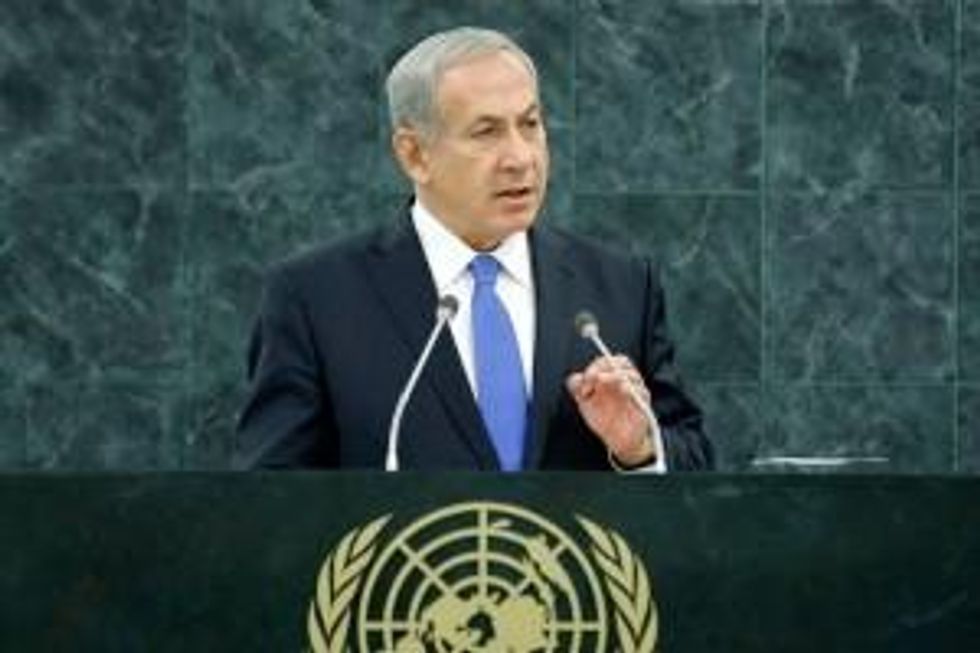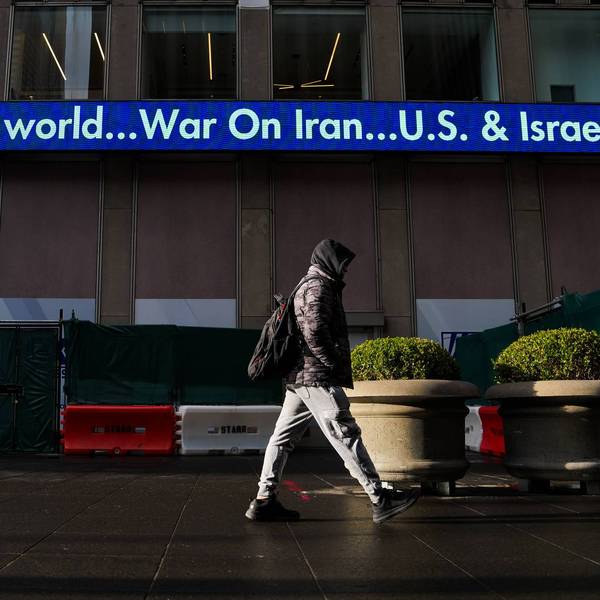NYTimes Again Ignores Israel's Nukes
If a country with a large but undeclared nuclear arsenal threatens war against a country without a single nuclear bomb, you might think that a serious news organization would note the existing nuclear arsenal at least in passing. But if the country doing the threatening is Israel and the country being threatened is Iran, the New York Times can't seem to find space to mention Israel's rogue nuclear weapons.

The fact certainly was relevant to the Times' storyabout Israeli Prime Minister Benjamin Netanyahu's United Nations speech which focused on his fear that Iran might build one nuclear bomb. And Netanyahu's threat of war against Iran was not exactly subtle, as he referenced the need for "credible military threats" and vowed that "if Israel is forced to stand alone, Israel will stand alone."
For Israel's threat to unilaterally destroy Iran's thus-far peaceful nuclear program to be "credible," Israel's nuclear weapons - at least its smaller tactical nukes - must be considered as possible elements of that attack. Indeed, I've been told that Israel's tentative war plans against Iran include potential use of low-yield nuclear bombs to shatter some of Iran's hardened sites.
But the New York Times article on Wednesday made no mention of Israel's possession of nuclear weapons. Neither did a companion Times editorial which catalogued reasons why the world should be skeptical of Iran's repeated insistence that it has no intention to build a nuclear bomb. The Times wrote:
"Iran hid its nuclear program from United Nations inspectors for nearly 20 years, and the country is enriching uranium to a level that would make it possible to produce bomb-grade nuclear material more quickly. It has also pursued other activities, like developing high-voltage detonators and building missiles that experts believe could only have nuclear weapons-related uses. These facts make it hard not to view the upcoming American-brokered negotiations skeptically."
Given the Times' excoriation of Iran over its alleged secrecy, basic journalistic fairness would seem to require that the Times point out that Israel has hidden its actual nuclear weapons arsenal from the United Nations for longer than 20 years - and Israel has gone far beyond simply pursuing some related activities, but actually has put sophisticated delivery systems in place.
The context of Israel's regional nuclear weapons monopoly also sheds light on why Iran might actually think it needs a nuclear weapon as a deterrent against the possibility of a preemptive nuclear strike by Israel. Yet, the Times didn't include a simple sentence acknowledging that Israel itself possesses nuclear weapons.
Surely, if the Times did publish such a sentence in its articles on Netanyahu's belligerent UN speech, the editors would have gotten some angry e-mails from staunch Israel backers and might have lost some subscriptions. But such fears do not justify journalistic cowardice and malfeasance.
Even the Washington Post, which has served in recent years as the media flagship for America's neoconservatives, recognized its journalistic duty to acknowledge the existence of Israel's nuclear weapons. In its story about Netanyahu's speech, the Post included this simple sentence at the end of a paragraph deep down in the article: "Israel possesses an undeclared nuclear weapons arsenal."
The sentence didn't amount to much. The Post could have done a lot more to elaborate on this reality and its relevance to Iran's behavior. But its inclusion represented at least a minimal nod to journalistic ethics. The Times couldn't bring itself to do even that.
An Urgent Message From Our Co-Founder
Dear Common Dreams reader, The U.S. is on a fast track to authoritarianism like nothing I've ever seen. Meanwhile, corporate news outlets are utterly capitulating to Trump, twisting their coverage to avoid drawing his ire while lining up to stuff cash in his pockets. That's why I believe that Common Dreams is doing the best and most consequential reporting that we've ever done. Our small but mighty team is a progressive reporting powerhouse, covering the news every day that the corporate media never will. Our mission has always been simple: To inform. To inspire. And to ignite change for the common good. Now here's the key piece that I want all our readers to understand: None of this would be possible without your financial support. That's not just some fundraising cliche. It's the absolute and literal truth. We don't accept corporate advertising and never will. We don't have a paywall because we don't think people should be blocked from critical news based on their ability to pay. Everything we do is funded by the donations of readers like you. Will you donate now to help power the nonprofit, independent reporting of Common Dreams? Thank you for being a vital member of our community. Together, we can keep independent journalism alive when it’s needed most. - Craig Brown, Co-founder |
If a country with a large but undeclared nuclear arsenal threatens war against a country without a single nuclear bomb, you might think that a serious news organization would note the existing nuclear arsenal at least in passing. But if the country doing the threatening is Israel and the country being threatened is Iran, the New York Times can't seem to find space to mention Israel's rogue nuclear weapons.

The fact certainly was relevant to the Times' storyabout Israeli Prime Minister Benjamin Netanyahu's United Nations speech which focused on his fear that Iran might build one nuclear bomb. And Netanyahu's threat of war against Iran was not exactly subtle, as he referenced the need for "credible military threats" and vowed that "if Israel is forced to stand alone, Israel will stand alone."
For Israel's threat to unilaterally destroy Iran's thus-far peaceful nuclear program to be "credible," Israel's nuclear weapons - at least its smaller tactical nukes - must be considered as possible elements of that attack. Indeed, I've been told that Israel's tentative war plans against Iran include potential use of low-yield nuclear bombs to shatter some of Iran's hardened sites.
But the New York Times article on Wednesday made no mention of Israel's possession of nuclear weapons. Neither did a companion Times editorial which catalogued reasons why the world should be skeptical of Iran's repeated insistence that it has no intention to build a nuclear bomb. The Times wrote:
"Iran hid its nuclear program from United Nations inspectors for nearly 20 years, and the country is enriching uranium to a level that would make it possible to produce bomb-grade nuclear material more quickly. It has also pursued other activities, like developing high-voltage detonators and building missiles that experts believe could only have nuclear weapons-related uses. These facts make it hard not to view the upcoming American-brokered negotiations skeptically."
Given the Times' excoriation of Iran over its alleged secrecy, basic journalistic fairness would seem to require that the Times point out that Israel has hidden its actual nuclear weapons arsenal from the United Nations for longer than 20 years - and Israel has gone far beyond simply pursuing some related activities, but actually has put sophisticated delivery systems in place.
The context of Israel's regional nuclear weapons monopoly also sheds light on why Iran might actually think it needs a nuclear weapon as a deterrent against the possibility of a preemptive nuclear strike by Israel. Yet, the Times didn't include a simple sentence acknowledging that Israel itself possesses nuclear weapons.
Surely, if the Times did publish such a sentence in its articles on Netanyahu's belligerent UN speech, the editors would have gotten some angry e-mails from staunch Israel backers and might have lost some subscriptions. But such fears do not justify journalistic cowardice and malfeasance.
Even the Washington Post, which has served in recent years as the media flagship for America's neoconservatives, recognized its journalistic duty to acknowledge the existence of Israel's nuclear weapons. In its story about Netanyahu's speech, the Post included this simple sentence at the end of a paragraph deep down in the article: "Israel possesses an undeclared nuclear weapons arsenal."
The sentence didn't amount to much. The Post could have done a lot more to elaborate on this reality and its relevance to Iran's behavior. But its inclusion represented at least a minimal nod to journalistic ethics. The Times couldn't bring itself to do even that.
If a country with a large but undeclared nuclear arsenal threatens war against a country without a single nuclear bomb, you might think that a serious news organization would note the existing nuclear arsenal at least in passing. But if the country doing the threatening is Israel and the country being threatened is Iran, the New York Times can't seem to find space to mention Israel's rogue nuclear weapons.

The fact certainly was relevant to the Times' storyabout Israeli Prime Minister Benjamin Netanyahu's United Nations speech which focused on his fear that Iran might build one nuclear bomb. And Netanyahu's threat of war against Iran was not exactly subtle, as he referenced the need for "credible military threats" and vowed that "if Israel is forced to stand alone, Israel will stand alone."
For Israel's threat to unilaterally destroy Iran's thus-far peaceful nuclear program to be "credible," Israel's nuclear weapons - at least its smaller tactical nukes - must be considered as possible elements of that attack. Indeed, I've been told that Israel's tentative war plans against Iran include potential use of low-yield nuclear bombs to shatter some of Iran's hardened sites.
But the New York Times article on Wednesday made no mention of Israel's possession of nuclear weapons. Neither did a companion Times editorial which catalogued reasons why the world should be skeptical of Iran's repeated insistence that it has no intention to build a nuclear bomb. The Times wrote:
"Iran hid its nuclear program from United Nations inspectors for nearly 20 years, and the country is enriching uranium to a level that would make it possible to produce bomb-grade nuclear material more quickly. It has also pursued other activities, like developing high-voltage detonators and building missiles that experts believe could only have nuclear weapons-related uses. These facts make it hard not to view the upcoming American-brokered negotiations skeptically."
Given the Times' excoriation of Iran over its alleged secrecy, basic journalistic fairness would seem to require that the Times point out that Israel has hidden its actual nuclear weapons arsenal from the United Nations for longer than 20 years - and Israel has gone far beyond simply pursuing some related activities, but actually has put sophisticated delivery systems in place.
The context of Israel's regional nuclear weapons monopoly also sheds light on why Iran might actually think it needs a nuclear weapon as a deterrent against the possibility of a preemptive nuclear strike by Israel. Yet, the Times didn't include a simple sentence acknowledging that Israel itself possesses nuclear weapons.
Surely, if the Times did publish such a sentence in its articles on Netanyahu's belligerent UN speech, the editors would have gotten some angry e-mails from staunch Israel backers and might have lost some subscriptions. But such fears do not justify journalistic cowardice and malfeasance.
Even the Washington Post, which has served in recent years as the media flagship for America's neoconservatives, recognized its journalistic duty to acknowledge the existence of Israel's nuclear weapons. In its story about Netanyahu's speech, the Post included this simple sentence at the end of a paragraph deep down in the article: "Israel possesses an undeclared nuclear weapons arsenal."
The sentence didn't amount to much. The Post could have done a lot more to elaborate on this reality and its relevance to Iran's behavior. But its inclusion represented at least a minimal nod to journalistic ethics. The Times couldn't bring itself to do even that.

